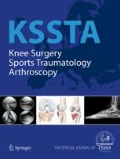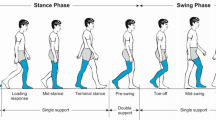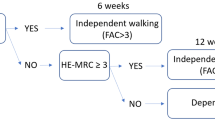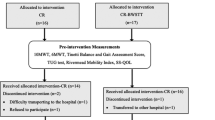Abstract
It is difficult to identify objective parameters for assessing the joint function when evaluating the outcome of orthopaedic procedures, especially endoprosthetic replacement. Spatial and temporal parameters of gait have clinical relevance in the assessment of motor pathologies, particularly in orthopaedics. However, the influence of gait speed on these biomechanical parameters has been difficult to be taken into consideration so far. The objective of the present study was to analyse the impact of gait speed on gait parameters and to set a standard walking speed for patients with osteoarthritis by means of a special treadmill control mechanism. The second objective is to compare the gait patterns in patients with unilateral osteoarthritis of the hip joint or of the knee joint to the gait pattern of healthy control subjects. A total of 20 patients with severe unilateral osteoarthritis of the hip, 20 patients with severe unilateral osteoarthritis of the knee and 20 healthy elderly subjects without any history of lower extremity joint pathology were investigated at four different gait speeds. The gait analysis equipment used consisted of an infinitely adjustable force-instrumented treadmill and an ultrasound-based motion analyser system with electromyography. Our data suggest that most of the biomechanical parameters depend on gait speed. The highest gait speed that all our patients with severe osteoarthritis were suitable with, without pain and loss of coordination, was 2.00 km/h. Our findings indicate that the changes in gait parameters may occur in patients with unilateral osteoarthritis of the hip joint or the knee joint compared to the gait pattern of healthy control subjects. Hip joint or knee joint degeneration was compensated for in part by the pelvis and other joints in the lower limb. Reduced motion of the hip joint or knee joint leads to an increased pelvic motion, which should affect the natural mobility of the lumbar spine and cause pain in the lumbar region of the spine because of their kinematic interaction.

Similar content being viewed by others
References
Alton F, Baldey L, Caplan S, Morrissey MC (1988) A kinematic comparison of over ground and treadmill walking. Clin Biomech 13:434–440
Al-Zahrani KS, Bakheit AM (2002) A study of gait characteristic of patients with chronic osteoarthritis of the knee. Disabil Rehabil 24:275–280
Andriacchi TP, Galante J, Fermier R (1982) The influence of total knee replacement design on walking and stair-climbing. J Bone Joint Surg Am 64:1328–1335
Baliunas AJ, Hurwity DE, Ryals AB, Karrar A, Case JP, Block JA, Andriacchi TP (2002) Increased knee joint loads during walking are presented in subjected with knee osteoarthritis. Osteoarthritis Cartilage 10:573–579
Berman AT, Quinn RH, Zarro VJ (1991) Quantitative gait analysis in unilateral and bilateral total hip replacement. Arch Phys Med Rehabil 72:190–194
Börjesson M, Weidenhielm L, Atsson E, Olsson E (2005) Gait and clinical measurements in patients with knee osteoarthritis after surgery: prospective 5-year follow-up study. Knee 12:121–127
Bullinger M (1996) Assessment of health related quality of life with the SF-36 Health Survey. Rehabilitation 35:17–27
Chao EY, Laughmann RK, Schneider E, Staffer RN (1983) Normative data of the knee joint motion and ground reaction forces in adult level walking. J Biomech 16:219–233
Childs JD, Sparto PJ, Fitzgerald K, Bizzini M, Irrgang JJ (2004) Alterations in lower extremity movement and muscle activation patterns in individuals with knee osteoarthritis. Clin Biomech 19:44–49
Crosbie J, Vachalathiti R (1997) Synchrony of pelvic and hip joint motion during walking. Gait Posture 6:237–248
Dujardin F, Aucouturier T, Bocquet G, Duparc F, Weber J, Thomine JM (1998) Kinematics of the healthy and arthritic hip joint during walking. A study of 136 subjects. Rev Chir Orthop Reparatrice Appar Mot 84:689–699
Frigo C, Bardare M, Corona F, Casnaghi D, Cimaz R, Naj Fivono PL (1996) Gait alterations in patients with juveline chronic arthritis: a computarised analysis. J Orthop Rheumatol 9:82–90
Gök H, Ergin S, Yavuzer G (2002) Kinetic and kinematic characteristic of gait in patients with medial knee arthrosis. Acta Orthop Scand 73:647–652
Grood ES, Suntay WJ (1983) A joint coordinate system for the clinical description of three-dimensional motions. Application to the knee. J Biomech Eng 105:136–144
Hulet CH, Hurwitz DE, Andriacchi TP, Galante JO, Rosenberg AG (1996) Gait adaptations in patients with hip osteoarthritis. Gait Posture 4:188
Hulet CH, Hurwitz DE, Andriacchi TP, Galante JO, Vielpeau C (2000) Functional gait adaptations in patients with painful hip. Rev Chir Orthop Reparatrice Appar Mot 86:581–589
Hurwitz DE, Hulet CH, Andriacchi TP, Rosenberg AG, Galante JO (1997) Gait compensations in patients with osteoarthritis of the hip and their relationship to pain and passive hip motion. J Orthop Res 15: 629–635
Hurwitz DE, Ryals AR, Block JA, Sharma L, Schnitzer TJ, Andriacchi TP (2000) Knee pain and joint loading in subjects with oasteoarthritis of the knee. J Orthop Res 18:572–579
Isacson J, Bromström LA (1988) Gait in rheumatoid arthritis: an electrogoniometric investigation. J Biomech 21:451–457
Ivarsson I, Gillquist J (1991) Rehabilitation after high tibial osteotomy and unicompartmental arthroplasty. A comparative study. Clin Orthop 266:139–144
Kaufman KR, Hughes C, Morrey BF, Morrey B, An KN (2001) Gait characteristics of patients with knee osteoarthritis. J Biomech 34:907–915
Kellgren JH, Lawrence JS (1957) Radiological assessment of osteoarthritis. Ann Rheum Dis 16:494–502
Kiss RM, Kocsis L, Knoll Zs (2004) Joint kinematics and spatial temporal parameters of gait measured by an ultrasound based system. Med Eng Phys 26:611–620
Knoll Zs, Kocsis L, Kiss RM (2004) Gait patterns before and after anterior cruciate ligament reconstruction. Knee Surg Sports Traumatol Arthrosc 12:7–13
Kocsis L, Béda G (2001) Closed formulae to determine the angular velocity of a body-segment based on 3D measurements. Acta Physiol Hung 88:1–13
Lee TH, Tsuchida T, Kitahara H, Moriya H (1999) Study using a linear regression model of normal controls-woman without arthroplaty. J Orthop Sci 4:13–21
Liebermann JR, Dorey F, Shekelle P, Schumaker L, Thomas BJ, Kilgus DJ (1996) Differences between patients and physicans evaluations of outcome after hip arthroplasty. J Bone Joint Surg Am 78:835–838
Loizeau J, Allerd P, Landjerit B, Duhaime M (1995) Bilateral gait patterns in subjects fitted with a total hip prothesis. Arch Phys Med Rehabil 76:552–557
Long WT, Dorr LD, Healy B, Perry J (1993) Functional recovery of non-cemented total hip arthroplasty. Clin Orthop 288:73–77
Mainka C, Boenick U (1994) Integrierte Gangbildanalyse mit Hilfe eines Laufbandergometers. Orthop Technik 7:682–689
Matsas A, Taylor N, McBurney H (2000) Knee joint kinematics from familiarized treadmill walking can be generalized to over ground walking in young unimpaired subjects. Gait Posture 11:46–53
Mattsson E, Olsson E, Brostörm LA (1990) Assessment of walking before and after unicompartmental knee arthroplasty. Scand J Rehabil Med 22:45–50
McCrory JL, White SC, Lifeso RM (2001) Vertival ground reaction forces: objective measures of gait following hip arthroplasty. Gait Posture 14:104–109
McGibbon CA, Krebs DE (2002) Compensatory gait mechanics in patients with unilateral knee arthritis. J Rheumatol 29:2410–2419
Messier SP, Loeser RF, Hoover JL (1992) Osteoarthritis of the knee: effects on gait, strength and flexibility. Arch Phys Med Rehabil 57:571–577
Möckel G, Perka C, Labs K, Duda G (2003) The influence of walking speed on kinetic and kinematic parameters in patients with osteoarthritis of the hip using force-instrumented treadmill and standardised gait speeds. Arch Orthop Trauma Surg 123:278–282
Mundarmann A, Dyrby CO, Hurwitz DE, Sharma I, Andriacchi TP (2004) Potential strategies to reduce medial compartment loading in patients with knee osteoarthritis of varying severity: reduced walking speed. Arthritis Rheum 50:1172–1178
Murray MP, Gore DR, Clarkson BH (1971) Walking patterns of patients with unilateral hip pain due to osteoarthritis and avascular necrosis. J Bone Joint Surg Am 53A:259–274
Murray MP, Gore DR, Brewer BJ, Gardner GM, Sepic SB (1979) A comparison of the functional performance of patients with Charnley and Muller total hip replacement. Acta Orthop Scand 50:563–569
Shakoor N, Hurwitz DE, Block JA, Shott S, Case JP (2003) Asymmetric knee loading in advanced unilateral hip osteoarthritis. Arthritis Rheum 48:1556–1561
Smidt GL, Wadsworth JB (1973) Floor reaction forces during gait: comparison of patients with hip disease and normal subjects. Phys Ther 53:1052–1062
Thurston AJ (1985) Spinal and pelvis kinematics in osteoarthritis of the hip. Spine 10:467–471
Wadsworth JB, Smidt GL, Johnston RC (1972) Gait characteristics of subjects with hip disease. Phys Ther 8:829–837
Wall JC, Ashbrun A, Klenerman L (1981) Gait analysis in the assessment of functional performance before and after total hip replacement. J Biomed Eng 3:121–127
Weidenhielm L, Olsson E, Broström LA, Börjesson-Hederström M, Mattsson E (1993) Improvement in gait one year after surgery for knee osteoarthritis: a comparison between high tibial osteomy and prosthetic replacement in a prospective randomized study. Scand J Rehabil Med 25:25–31
Whittle MW (1996) Gait analysis 2nd edn. Buttherworth Heinemann, Oxford
Acknowledgements
This work was supported in part by the Hungarian Scientific Fund T049471 and Semmelweis Foundation. We are indebted to Professor Kocsis for providing access to the Biomechanical Laboratory at the Budapest University of Technology and Economics and his assistance in experiments.
Author information
Authors and Affiliations
Corresponding author
Rights and permissions
About this article
Cite this article
Bejek, Z., Paróczai, R., Illyés, Á. et al. The influence of walking speed on gait parameters in healthy people and in patients with osteoarthritis. Knee Surg Sports Traumatol Arthr 14, 612–622 (2006). https://doi.org/10.1007/s00167-005-0005-6
Received:
Accepted:
Published:
Issue Date:
DOI: https://doi.org/10.1007/s00167-005-0005-6




